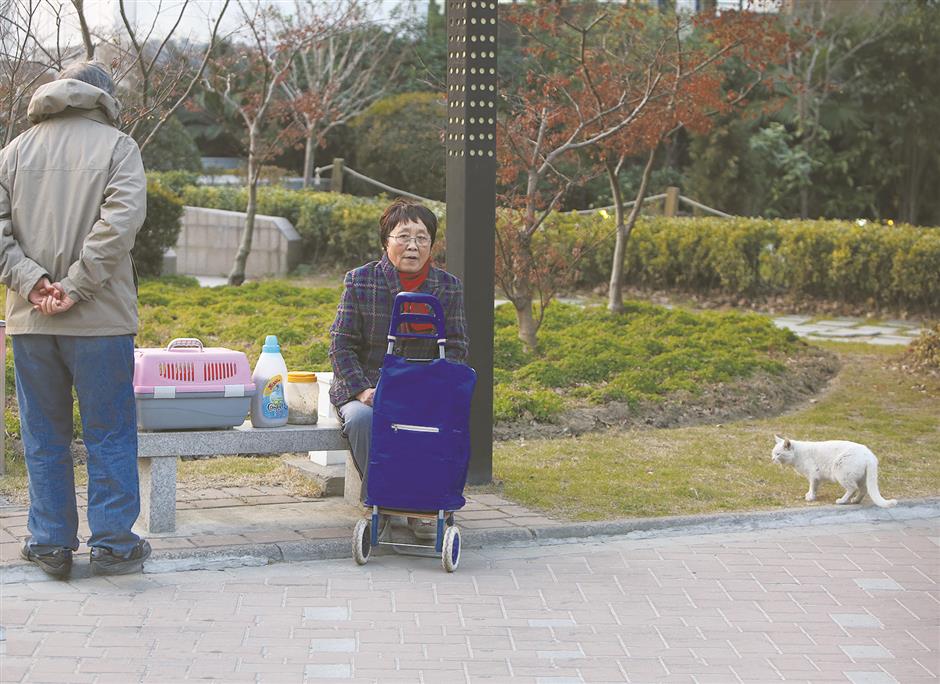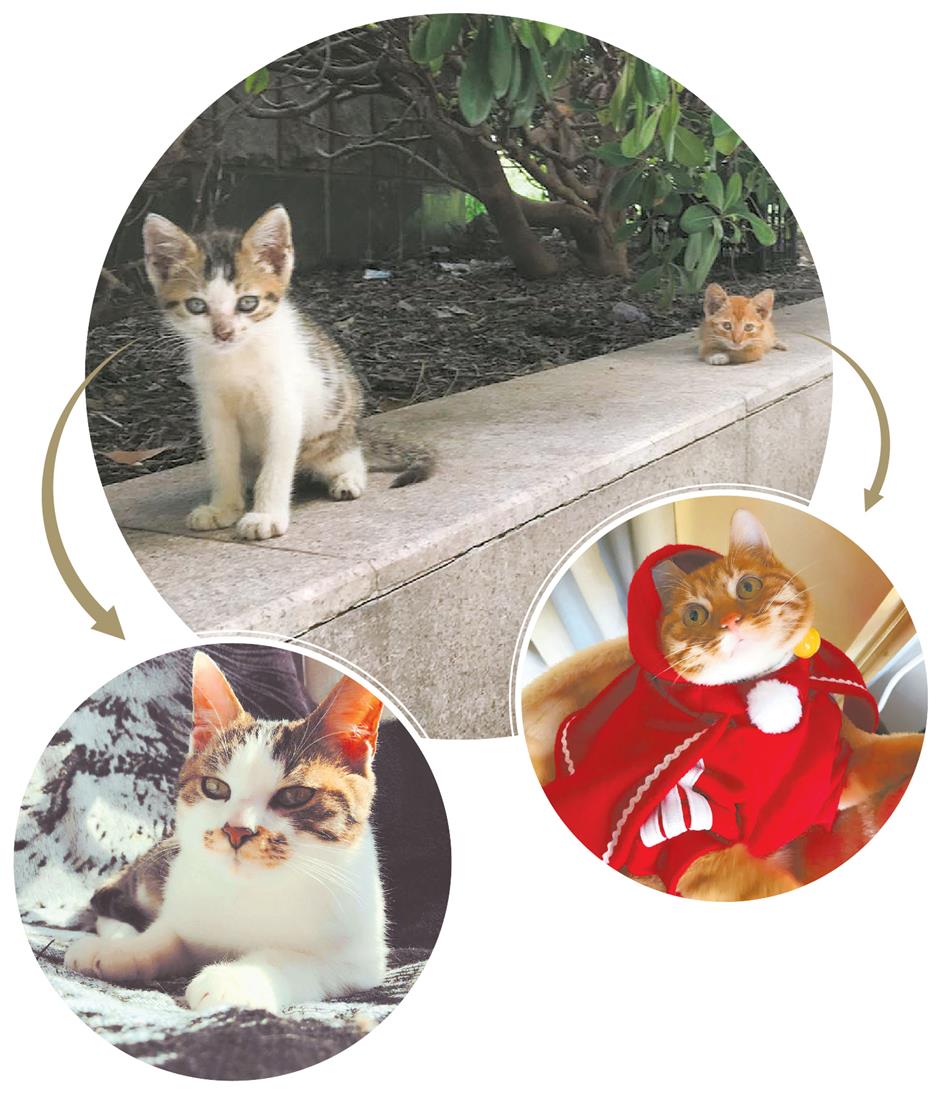It's no cat's meow out on the mean streets
Every day Hongqiao District resident Pan Wenlei goes to a nearby park carrying bags of food and water. It’s time to feed the stray cats, many of whom mill around waiting for her daily appearance.
“I live and breathe cats,” she said. “I’m obsessed.”
Pan, 45, is not the only one worried about the plight of homeless cats.
According to pet organization Shanghai Adoption Day, there are at least 248 people in the city looking after the welfare of an estimated number of 3,000 alley cats. The volunteers come from all walks of life, from white-collar employees to retirees.

Shanghai resident Pan Wenlei captures a cat in a Shanghai park to send it to hospital for neutering. She feeds stray cats every day and helped find homes for 103 felines last year.
One of them is Jo Xie, a journalist who has been helping stray animals for decades.
“I can never resist a cute animal,” she said with a smile.
She puts food out for stray animals while walking her dog every day and has helped find homes for stray cats and dogs.
“I truly wish people would be more responsible toward their pets and never abuse or abandon them,” said Xie. “That would be a benefit to all of society.”
Vivien Yuan, an animal rescue volunteer in Shanghai, agreed.
“Animal welfare is related to many issues, such as education, traditional values, social pressures and mental illness,” she said.
“I wish the public could control the numbers of stray animals in a more humane way than just killing them.”

In many communities across Shanghai, people from all walks of life are working to improve the plight of stray animals who have to fight to survive on the streets of the city.
Back in Pan’s neighborhood, she is busy filling bags with food and water for her daily cat round.
She spends an hour a day, rain or shine, feeding cats at well-worn stops. She is meticulous about what they eat.
“Feeding human leftovers to cats can cause malnutrition, disease and environmental problems,” she said. “That’s one reason some people are against feeding alley cats.”
Pan works with the nonprofit animal welfare group Blue Ribbon in Shanghai to catch and neuter stray cats. She said neutering can reduce roaming, catfights and the pungent odor emitted by cats in heat.

Stray cats congregate in a Shanghai park, hoping for handouts or stray food scraps from passers-by.
Cats make ideal pets for many people, Pan said, recalling the case of a man who adopted a rescued cat and said the animal helped cure his insomnia.
She said there is also anecdotal evidence that the soothing sound of a cat purring can reduce headaches, lower stress and ease shortness of breath.

Before and after: photos document how a happy home transforms the health and happiness of alley cats.
“The ultimate solution is to find good homes for stray cats and dogs,” Pan said.
Last year, Pan assisted in finding homes for 103 cats.
“Those are the cases where I participated in the whole process, from trapping the cats to handling adoption procedures,” she said. “I don’t remember how many I have helped on a less involved basis.”

Feeding stray cats human leftovers can cause disease and an unclean environment. Animal rights advocates are seeking better ways to help homeless animal populations.
Animal management
Pan currently spends around 8,000 to 10,000 yuan (US$1,270 to 1,587) a month on her “obsession” but admits that even those sums aren’t enough.
“One time I saved a cat with ear infection and the operation alone cost 8,000 yuan,” she said. “I have learned a lot about medical care for cats, and now I can deal with many problems without expensive visits to a veterinarian.”
She admitted that some people may consider her devotion to stray cats peculiar.
“Some people don’t get why I have devoted so much to rescuing cats,” she said. “I guess everybody has his or her own thing. I’m okay with not going out traveling or shopping. Helping cats is my spiritual enjoyment.”
She said public education about pets and animal welfare needs to be increased.
Many kittens roaming the streets weren’t born there; they were dumped by cat owners who couldn’t afford to raise them.
Many animal rights advocates in China point to the German system as a model of animal management and protection.
Before adopting or purchasing a dog, a German resident needs to get a license that involves demonstrating knowledge about how to raise a pet.
The would-be owner’s home is checked to ensure that it is a proper environment for an animal. Successful candidates need to pay fees, insure the dog and enroll it in a designated training school.
In addition, Germany has strict legal enforcement regarding animal neglect and abandonment.
“The German model could help solve the problem of stray animals here,” Pan said, noting that similar methods have been applied in Japan and Turkey, where most stray animals are registered and implanted with chips.

Actress Sun Li attends a cat adoption day to lend her name to the goals of a local animal welfare program.
Steven Zhou, chief executive of Blue Ribbon, said that rescuing stray animals is a demanding, never-ending job. The organization promotes what is known as the “TNR” method — trap, neuter and return. But it also conducts community education programs on raising pets.
“Comprehensive animal welfare services could benefit both human and animals,” Zhou said. “It’s important to inform the public that by helping stray animals, they are creating a better environment for themselves.”
Currently, there are no specific laws on the books protecting pets and stray animals, but there are regulations that pet owners must keep their animals from bothering neighbors.
“We hope to see more financial and legal support offered to rescue stray animals,” Zhou said.
Wang Chuanlan, a sociology professor at Fudan University, said animal welfare requires the participation of the public, government and community organizations.
“It’s hard to eliminate animal abuse and abandonment, but a harmonious environment where people and animals co-exist peacefully could be achieved,” she said.
During the recent Spring Festival, Pan was out on her daily round feeding stray cats in the park.
“I had some time, so I made a bit of nutritious homemade food for the cats during the holiday,” she said. “I’m a foodie, so I wanted them to have healthy, tasty food, too.”
One person can make a small difference, but the problem requires a bigger canvas of support.
“Raising pets in a rational way should be advocated along with rescue programs,” she said. “I will continue to do my bit as much as I can. I won’t abandon these cats.”















